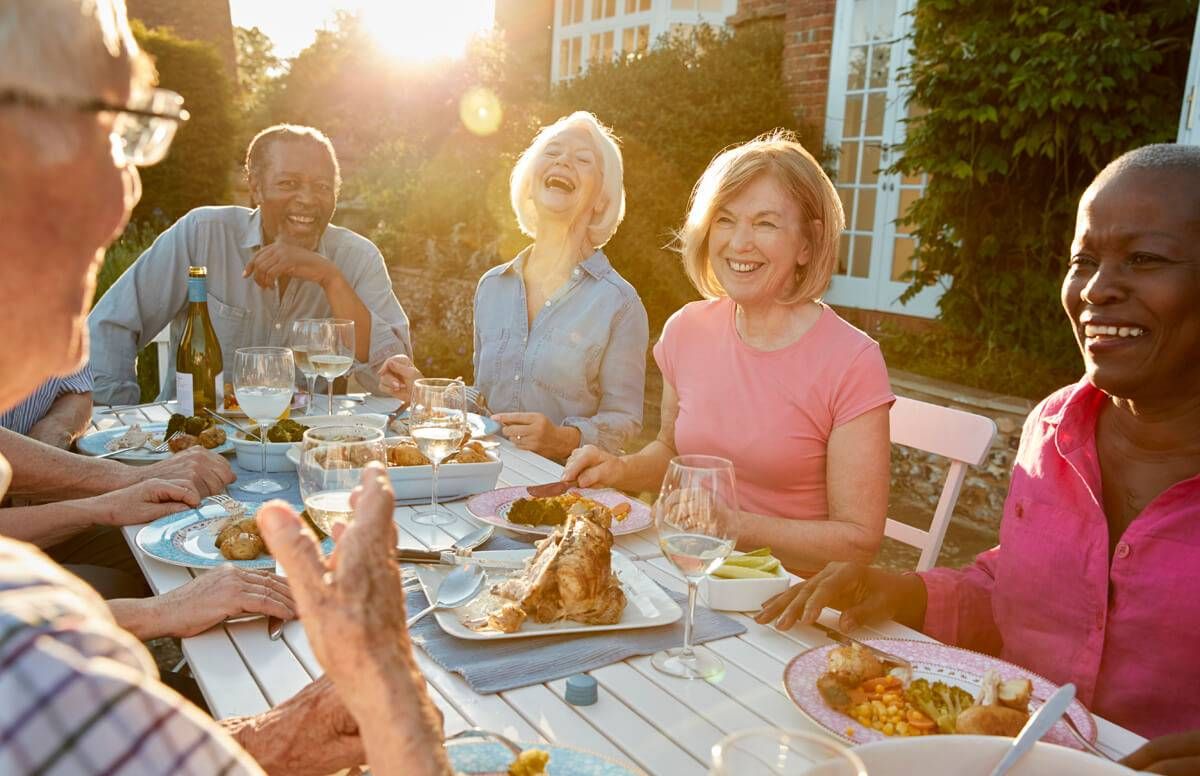5 Ways to Stay Social (and Why It's Important)
Increased social activity is one of the benefits of living in a retirement community

(Editor’s note: This content is sponsored by Acts Retirement-Life Communities.)
At any age, social interaction is one of the key ingredients for good health. Research shows that the bonds you form with your friends and throughout your community can keep you not just emotionally healthy but physically healthy as well. Some research even suggests that lack of social connections can cause health problems like depression and high blood pressure.
Why Socialization is Important
As you age, those health benefits are heightened, making the need to socialize even more crucial to your overall well-being. According to CNN and the Harvard School of Public Health, scientists now think that being social may improve senior health in the following ways (and more):
• Helps you live longer
• Relieves pain
• Reduces your risk of stroke
• Reduces the risk of Alzheimer’s disease
• Boosts your immune system
Yes, it’s possible that spending the evening with your buddies or taking a trip to see your family can improve your health in addition to your mood. Socializing may even help prevent post-retirement depression. Click here to read additional ways to deal with post-retirement depression.
Knowing this, you may feel differently about spending too much time in isolation (watching television alone in your room, for example). Below are five ways to stay social, so that you may experience the wonderful myriad of health benefits everyone’s talking about.
Did you know that increased social activity is one of the benefits of living in a retirement community? Click to read more about the 7 benefits of living in a retirement community.
1. Become a Student Again
You’ve heard it a million times: keep the brain active and you’ll stay sharper longer. That doesn’t just mean doing Sudoku every morning. While everyone interprets this advice differently, most experts agree that a class where you learn something is far better than mind games. But besides being great for your brain, learning in a classroom setting is also one of the best ways to stay social.
Going to class helps ward off loneliness. By finding a class you love, you have a greater chance of meeting people with similar interests, with whom you’ll have lots to talk about. And physiologically, learning new things helps restore neural pathways in your brain, which is a benefit in and of itself.
Most community colleges, community centers, senior centers, or public libraries can connect you with local classes happening in your area. Your own retirement community if you live in one likely offers classes for common hobbies such as painting, woodworking, and the like. Another option, if it’s hard to get to a classroom, is to have a private instructor come to your home for language lessons. Many will come to your home and teach small groups the basics of Spanish, French, or whatever you’ve got in mind.
This goes for any type of class you can dream of: there might be someone willing to teach private group classes right in your living room. Be sure to vet them properly before letting them into your home.
Read more about the benefits of mental stimulation for older adults.
2. Bring Out Your Inner Chef
Even if you’ve been cooking all your life, there are ways to renew your passion for the culinary arts that will also help to improve your social life. For example, providing fun, exciting meals for your friends or family can spark your social life as you discover new dishes together.
Better yet, start your chef’s journey by taking a cooking class. You’ll meet people and learn new techniques. Both will help you slide easily into your new role as chef extraordinaire.
Cooking for others is not only incredibly satisfying and heart-warming; it’s a way of staying active, too. Think about all the actions you perform while preparing a big meal. From grocery shopping to food prep to setting a beautiful table and cleaning up afterward, it’s a workout!
Again, your local community college, public library, or retirement community are great places to start. In addition, look for private cooking instructors who offer classes in a more intimate environment. Usually working as freelancers, they teach gourmet techniques right out of their own kitchens (or yours, if you prefer).
3. Get a Birds-Eye View
If you enjoy nature, it’s worth it to give bird-watching a try. Birding may not be for everyone, but it’s one of the most rewarding social activities because the benefits are so diverse. Most importantly, it’s a great way to get out there and immerse yourself in the natural world with others (and get some quality sun and exercise!).
One way to participate is to contact your local Audubon Society and see if there’s a bird count happening in your area soon. Every year, they rely on volunteer birders to comb the local areas and make note of the types of birds they see.
4. Go Golfing
Golfing-retirement clichés aside, the golf course is still a great way to stay social. Newbies can take group classes: almost every golf club, even the private golf courses, offer classes for beginners. You’ll also benefit from the physical component that’s required from swinging a club and moving around the course. Mentally, golf helps you sharpen your skills because it requires concentration and because you have to pay attention to technique. Then there’s also the opportunity for lunch and drinks with friends!
Golf is a great form of exercise. There’s a big different between watching The Masters and playing like a master. Read about the importance of physical exercise as you age.
5. Give Back
Volunteering in your community offers the best type of socialization. You get to work with people of all ages, which is something scientists think is important to well-being. And your volunteering activity can also bring a sense of purpose within your community, something lots of retired people have a hard time finding.
Senior Corps, a national organization started during the Kennedy era, connects older Americans with volunteer opportunities in their own community. From becoming a library volunteer to spending time at your local animal shelter there’s a wide range of opportunities if you want to help out.
You don’t have to sign up with a governmental agency, however, to give back. Some seniors find that offering their services to family members is fulfilling. For example, babysitting will bring you closer to your family, with the added benefit that chasing around after kids will help you stay in shape!
Simply being engaged with life, sharing your thoughts and feelings with close friends, or joining group events and mingling might help you feel a stronger sense of enthusiasm for life. It’s those feelings of hope, renewal, and happiness that combine to form the kernel of “good vibes,” which, as we all know, often seem to lead to good health.
Want more information about the importance of socialization? Read about the significant mental and physical benefits of older adults who regularly exercise.

Acts Retirement-Life Communities is the largest not-for-profit owner, operator and developer of continuing care retirement communities in the United States. Headquartered in suburban Philadelphia, Acts has a family of 23 retirement communities that serve approximately 8,500 residents and employ 6,200 in Pennsylvania, Delaware, Maryland, North and South Carolina, Georgia, Alabama and Florida. For more information about Acts visit actsretirement.org.

